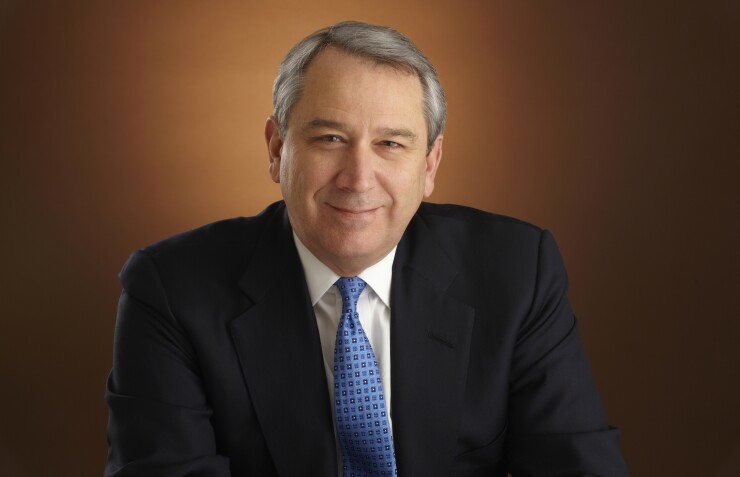While Wells Fargo's board looks far and wide for the bank’s next leader, some of the company’s most senior insiders have an alternative proposal: Why not keep the interim chief?
C. Allen Parker, who joined the bank as general counsel to help clean up scandals in 2017, became acting chief executive in March, when the board announced it’s seeking an outsider to take over. Across the industry, the expectation is that the next leader will shake up management. Keeping Parker, 64, is seen as a way to foster continuity and give the board more time to groom a permanent successor — maybe even from within.
Directors have asked senior executives for input, and some are lobbying for Parker to stay on as CEO, according to people familiar with the discussions.

It’s unclear whether the board, regulators and the bank’s many critics would be receptive to such a move. Senator and presidential candidate Elizabeth Warren, for example, has thumped on Wells Fargo for years, demanding it stop promoting company veterans to hold colleagues accountable. Some might try to argue Parker meets the definition of an outsider — he joined the bank only two years ago to clean things up. Yet that time also gives him a head start in understanding the firm’s problems.
“Although I do not know Allen well personally, I do know that he’s very highly regarded both internally and externally, especially in legal and regulatory matters,” former Wells Fargo CEO and chairman Richard Kovacevich said in an interview. He didn’t weigh in on whether Parker should stay.
A Wells Fargo spokesperson declined to comment on behalf of Parker and the board.
People with direct knowledge of the internal discussions about Parker agreed to described executives’ views on the condition they not be named. At this stage, none predicted he will necessarily get the job. Two emphasized the board has just started its hunt and that it probably will look at a number of candidates before reaching a decision.
Finding someone to take over the top job at Wells Fargo will be a challenge. The pool of financial-industry executives ready to lead such a massive and complicated company is shallow. The job description is unusually daunting, with the bank in the midst of reforms, mired in regulatory probes and operating under a Federal Reserve cap on growth.
The board hired executive recruiting firm Spencer Stuart to run the search, and it’s been casting a wide net to find initial candidates, people familiar with the situation have said.
Banks usually prefer to promote CEOs from a bench of internal executives so they can groom and test potential leaders over a period of years. None of the nation’s four largest commercial banks has installed an outsider as CEO since the lenders were created in a wave of mergers in the 1990s.
Part of the pitch for Parker is that he previously ran a large organization — the law firm Cravath Swaine & Moore. He’s also steeped in the bank’s legal and regulatory woes.
In the wake of the financial crisis, Bank of America's broad search for a CEO concluded with Brian Moynihan, who had run business lines but also served as its general counsel. His legal expertise came in handy as he spent years guiding the company out of probes and litigation — a task he once likened to carrying a 250-pound backpack in an uphill race, in which competitors were unencumbered. He still has the job.
Wells Fargo shareholders might go for a similar approach.
“The main thing the market wants is someone who’s going to get the regulators off their backs and also take care of the asset cap pretty quickly,” said Eric Compton, an analyst at Morningstar.
But is Parker enough of an outsider?
“I would think so,” Compton said. “He’s part of the new wave.”
The scandals erupted in 2016 with the revelation that Wells Fargo employees had opened legions of phony accounts to meet sales goals. John Stumpf stepped down as CEO in the aftermath. And when the board promoted Tim Sloan to the job, critics questioned whether the three-decade company veteran could be trusted to clean things up.
Sloan embarked on a sweeping overhaul with the board’s support. But as abuses emerged in more units, external pressures mounted. He resigned days after a congressional hearing in March, and Chair Betsy Duke vowed to find an outsider to “complete the transformation.”
Before Sloan’s abrupt departure, internal candidates seen as most likely to someday succeed him included Mary Mack, who runs the company’s retail bank, and Jon Weiss, who heads wealth and investment management.
Recruiting a CEO externally can pose risks for top executives by raising the odds that there will be major changes to strategy or management. After Barclays named former JPMorgan Chase executive Jes Staley as CEO in 2015, he recruited extensively from his former employer to reshape the firm’s leadership. Similar scenarios have played out at U.S. banks that hired executives from rivals to lead major divisions.
Wells Fargo’s representatives have reached out to Eileen Murray, co-CEO of the hedge fund Bridgewater Associates, as part of the bank’s CEO search, The Wall Street Journal reported Monday. Recruiters have also pointed to key deputies at bigger rivals and chiefs of regional banks as potential candidates.
When naming Parker interim CEO, Duke cited his “thoughtful and independent points of view to business, strategy and governance matters.” She also noted he “has earned the respect and full confidence of our board and executive team.”





